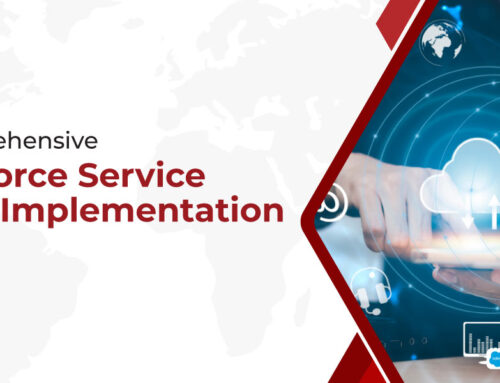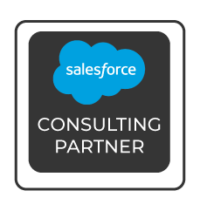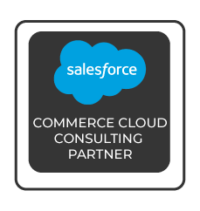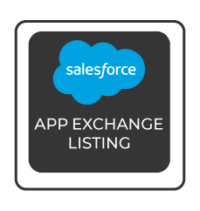Salesforce Marketing Cloud Implementation Guide
Salesforce Marketing Cloud is the ultimate marketing automation software that takes your business’s marketing efforts to the next level. With its top-notch marketing features, Salesforce Marketing Cloud implementation lets you create personalized and automated customer relationships like never before
Experience a 25% increase in leads, a 35% boost in lead conversions, and a staggering 30% increase in marketing ROI.
Nowadays, businesses face the challenge of satisfying customer requirements and maximizing efficiency while juggling multiple customer relationships. So, older marketing tactics make no sense here when Salesforce Marketing Cloud implementation can change the game.
In this blog, we’ll discuss the process of Salesforce Marketing Cloud implementation and its benefits and features. So, let’s get started!
What is Salesforce Marketing Cloud?
Salesforce Marketing Cloud, formerly known as Exact Target, is a game-changing platform that has various marketing tools to deliver exceptional customer experience at every interaction.
Marketing Cloud can integrate with different marketing channels. Marketers can use data-driven strategies and minimize manual efforts while delivering customized content to each customer.
Marketing Cloud is capable of the following:
- Combining different data types, communication channels, and interaction points can create a complete picture of customer preferences.
- Transform interaction with every customer into a seamless and customized experience using Einstein’s data and artificial intelligence.
- Customize real-time experiences to each customer’s preferences, transforming marketing into a dynamic conversation between brands and customers.
- Quantify, improve, and analyze the impact of marketing tasks and customer devotion.

Top Features of Salesforce Marketing Cloud
Salesforce Marketing Cloud is the leading marketing platform for businesses to improve their online presence. It offers a versatile toolkit for delivering the best service to customers.
Let’s have a look at the tools of Marketing Cloud:
1. Email Studio
Take your email marketing to the next level with Email Studio. Seamlessly personalize email messages using data from Sales Cloud, Service Cloud, or from another source. Whether it’s a promotional, transactional, or triggered message, Email Studio offers strong segmentation, automation, and predictive features. You can get deep insights into performance with its reporting tools.
2. Social Studio
Improve your business’s social media presence with the Customer Success Platform. Social Studio offers a seamless social media management solution that allows you to effortlessly manage, schedule, create, and monitor posts in one unified interface. Organize your posts by brand, region, or team, and take advantage of real-time publishing and engagement features.
3. Advertising Studio
You can use customer data with Marketing Cloud’s Advertising Studio to attract new customers, re-engage with inactive customers, and optimize your ad campaigns along the customer journey. With this ultimate solution, you can manage to advertise new prospects.
Activate CRM data for targeted campaigns, create integrated campaigns with Journey Builder, and connect leads in real-time with Lead Capture. Advertising Studio gives your business amazing tools to manage your advertising campaigns effectively.
4. Web Studio
Design visually appealing websites and landing pages with personalized content. Get valuable insights by analyzing their behaviors and tracking their interactions.
Marketers can monitor real-time customer engagement on their landing pages and extract valuable insights. Also, Web Studio seamlessly integrates landing pages with the customer journey, ensuring a seamless user experience.
5. Journey Builder
Creating the perfect customer journey includes using marketing automation to connect with your audience seamlessly across various touchpoints. With Journey Builder, you can create personalized experiences that cater to your customers’ preferences, behaviors, and interactions. You can customize your messaging to resonate with your customers by analyzing their browsing habits and purchasing history.
6. Audience Builder
Use customer data to build lasting connections at every step of the journey. From data management to meaningful relationships, Audience Builder has got you covered.
7. Personalization Builder
Personalization Builder with Einstein’s Predictive Intelligence can pair customer profiles with cutting-edge machine learning algorithms to deliver customized content to every individual. Businesses can create customized marketing approaches and improve customer service by analyzing customer’s activities.
8. Content Builder
Content Builder easily manages all your content and assets in one place. With advanced search and tagging capabilities, handling assets has never been easier. You can build landing pages and email templates. Its user-friendly drag-and-drop interface saves time and lets you create polished emails without having HTML expertise.
9. Contact Builder
Gain easy access to demographic and behavioral insights, segmenting data into ‘attribute groups,’ ‘events,’ and ‘population.’ Effortlessly manage and consolidate contract data from multiple sources, including ERP, CRM, and POS systems. Personalize customer interactions and streamline data usage to improve marketing strategies and customer relationships.
10. Analytics Builder
Track your campaigns and customer journeys with this amazing tracking and analytics tool. Its Email Analytics and Reporting feature allows you to get the details of your email marketing campaigns, providing essential data on open rates, click-through rates, and unsubscribe rates. It also delivers complete reports for all channels available in the Salesforce Marketing Cloud.
11. Marketing Cloud Connect
Sync up your customer experience across every department. Marketing Cloud Connect can trigger journeys and messages as customers engage with any part of your company, delivering a seamless experience at every interaction.
It integrates Salesforce Marketing Cloud tools with Salesforce CRM, Sales, or Service Cloud, enabling you to build stronger customer relationships through data-driven personalization and automation.
12. Marketing Cloud Intelligence
Marketing Cloud Intelligence, formerly known as Datorama, can transform your business’s marketing strategy. This tool unifies data from all your marketing tools, performing ETL for multiple data sources to provide you with a single source of truth. Datorama Marketplace allows developers to create personalized apps that use the platform’s cutting-edge marketing intelligence technology.
Why Your Business Should Go for Marketing Cloud Implementation
Let’s see why your business should implement Salesforce Marketing Cloud:
360 Customer View
Salesforce Marketing Cloud offers a 360-degree customer view that allows you to:
- Get deep insights into customer preferences to customize your marketing strategies.
- Create personalized campaigns that go best with your targeted audience.
- Increase conversion rates and develop stronger engagement through targeted marketing efforts.
Multi-Channel Messaging
You can create customized SMS and emails for your customers. Multi-channel messaging will help you:
- Revise and fortify customer care processes.
- Improve consumer interaction for purchase-related inquiries.
- Simplify and humanize financial correspondence.
Scalable & Flexible
Salesforce Marketing Cloud offers unmatched flexibility and scalability, whether you’re a startup or a seasoned enterprise. It empowers your business to thrive in an ever-changing business landscape.
- Scale up your business seamlessly.
- Stay agile in shifting markets.
- Create dynamic strategies for ever-changing customer needs.
Seamless Integration
Marketing Cloud seamlessly integrates with other Salesforce products, such as Salesforce Service Cloud and Sales Cloud, to offer customers a better experience.
- Sync success across sales, marketing, and services.
- Effortlessly streamline workflows.
- Create consistency for unforgettable customer connections.
Advanced Automation
You can streamline your business with automated tasks, personalized content, and improved campaign performance.
- Handles audience classification and content customization.
- Optimize performance and increase efficiency with AI-driven insights.
Analytics & Insights
Decision-making is the cornerstone of marketing strategies. Within Salesforce Marketing Cloud, analytics tools empower businesses to:
- Quantify the impact of their campaigns.
- Monitor key performance indicators (KPIs) to assess success.
- Hone marketing strategies.
- Improve overall performance and ROI.

Salesforce Marketing Cloud Implementation Process
Now, let’s have a look at how to implement Marketing Cloud:
1. Create Business Units
- Go to Setup in Marketing Cloud Engagement
- Click on Business Units to proceed
- Start by clicking Create
- Provide the name, description, and other details for the business unit
- Customize the time zone and date format based on user locations
- Select the parent business unit for this new child unit
- Add the display name and default email address for outgoing emails
- Input the physical mailing address as per CAN-SPAM regulations
- Choose the Unsubscribe Settings for the business unit
- Save Business Unit
2. Add Users and Roles
- Go to Setup in Marketing Cloud
- Click Users
- Click Manage Business Units to add users to business units
- Select default business units & assign the user to business units
- Save Changes
3. Set Up Email-sending Domains & Sender Profiles
- Configure domains from which you’ll send emails (e.g., your organization’s domain).
- Create “Sender Profiles” to define the sender’s information (e.g., name, email address) for consistent branding and authentication.
4. Build an Email from a Template in Content Builder
- Go to Content Builder and click on “Create” followed by “Email Message”
- Choose a template from the Template dropdown and click “Select”
- Name your email and click “Next” to add content
- Drag content blocks from the Blocks tab to the editor’s content areas
- Click “Plain Text” to view and update the email for subscribers with non-HTML email clients
- Select the Layouts tab, drag layouts to the editor, and then drag blocks into the content areas to create a content group.
- To change the template and styles, go to the Design tab and click “Change Template”
- Enter an email subject and optional preheader, then click “Next” to preview and test your email
- Use Journey Builder or Email Studio to send the email
- To modify an existing Email Template, select the Email Name, click “Properties,” make changes, and then apply the template changes.
5. Connect Marketing Cloud with Salesforce CRM
Integrate Marketing Cloud with your Salesforce CRM instance. This connection allows seamless data synchronization, enabling personalized marketing based on CRM data.
6. Create a Marketing Cloud Data Model
- Go to Contact Builder and start the development of your Marketing Cloud data model
- Connect your different data sources, but don’t import data for now
- Setup your Data Extension and define their specific attributes
- Create an Attribute Group in Data Designer and create connections between the Data Extension and attributes to ensure they can be used in Journey Builder decisions
- Proceed with importing your contact data into the appropriate Data Extensions.
7. Prepare for Your Initial Marketing Campaign
- Plan your first campaign using “Journey Builder.”
- Map out customer journeys, automate interactions, and create personalized experiences across channels (email, mobile, social media, etc.)
Best Practices for Salesforce Marketing Cloud Implementation
Let’s have a look at what things you should prefer before and while implementing Salesforce Marketing Cloud:
Set Clear Objectives
First of all, pinpoint your starting point and create your dream team. Now, it’s time to set a crystal-clear goal for your debut project using Marketing Cloud. Align your measurable goals closely with your business goals to optimize ROI and show some real results.
Define Your Targeted Audience
It’s time to lock in your audience and smooth out any CRM wrinkles. Once that’s sorted, collect the right data to power up your customized campaigns.
Get Expert Guidance
Hire a professional for Salesforce Marketing Cloud implementation services, as he/she will guide you throughout the process. With expert Salesforce implementation partners, you don’t need to worry about deployments, risks, and, of course, results from Marketing Cloud.
Conduct Complete Assessment
Before implementing Salesforce Marketing Cloud, go for your current marketing campaign assessment. Identify all challenges that you faced in your last marketing processes and how you can improve them to effectively implement new strategies.
Data Quality and Integration
For successful marketing, data is supreme. Improve your strategy by refining, unifying, and streamlining your customer data before it migrates into the Salesforce Marketing Cloud. Seamlessly connect your systems to guarantee a smooth flow of data across all platforms.
Track Performance
Marketing Cloud implementation is just a start. You need to keep an eye on the performance of your marketing campaigns and analyze key metrics to find pain points and improve them. Try out new features and keep refining your strategies to stay in the loop with the latest industry trends.
Conclusion
Companies need to bring their A-game to truly excel in today’s fast-paced business world. With Salesforce Marketing Cloud, teams can use tools to automate tasks, create customized experiences, and uncover invaluable insights all in one platform.
However, Salesforce Marketing Cloud implementation isn’t everyone’s cup of team. This challenging process needs expertise. Team up with a Salesforce implementation partner to get the most out of this platform.
Innovadel Technologies can help you as an implementation partner to set up Marketing Cloud. Contact us now!
Related Posts
If you enjoyed reading this then please explore our other Articles below








